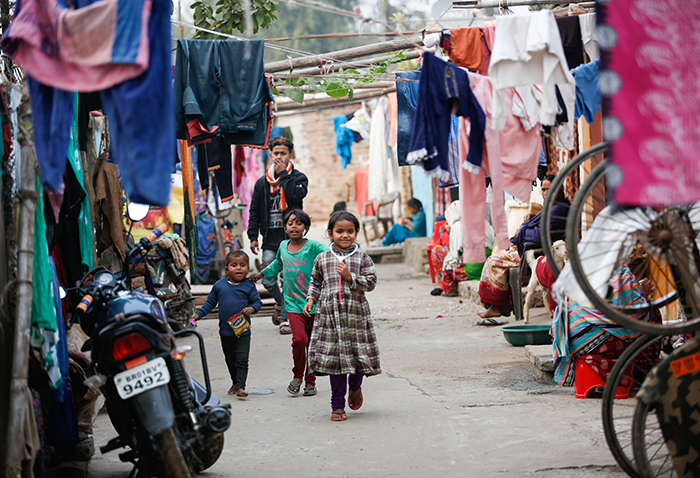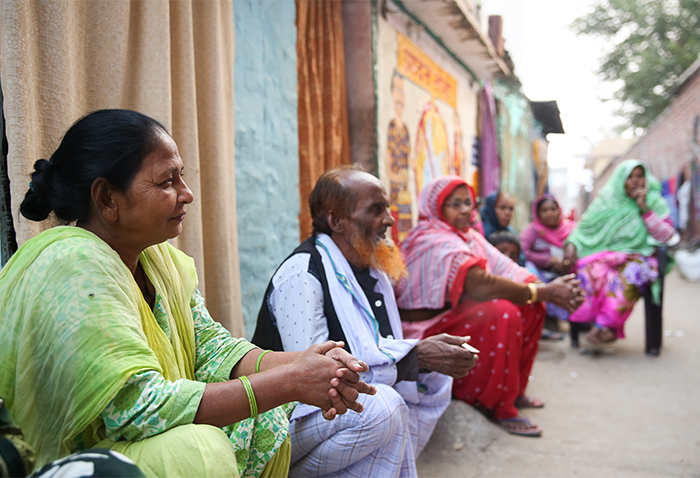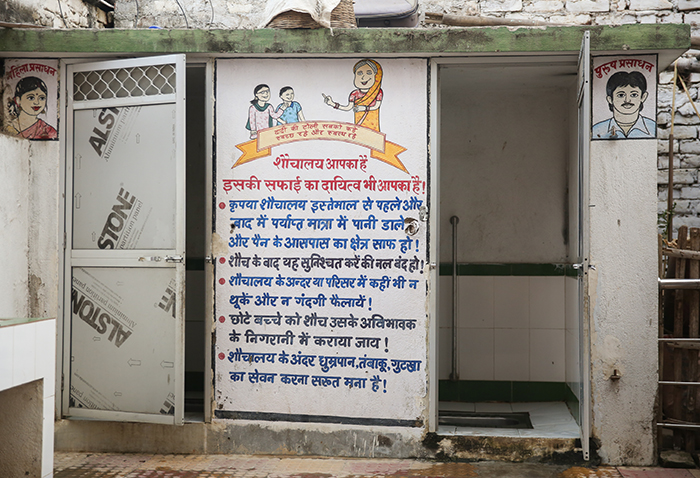
Patna, the capital city of the Indian state of Bihar, sprawls along the South Bank of the river Ganga, in the northeastern part of India. With buzzing rickshaws, loud car horns, and chatty street vendors, Patna is home to over 2 million people. Nearly two-thirds of its people live in informal settlements, or densely populated slums. A drive through the city reveals rows of makeshift, brick, or mud-walled tenements. Many shanties with single rooms house large families and offer no privacy. These families have stories about how they left their rural villages in search of better livelihoods. Caste dynamics, a relic of India’s social stratification system, continues to skew educational and economic opportunities. Nine out of ten slum dwellers are from historically oppressed castes.
These informal settlements lack basic infrastructure, safe drinking water, and toilets. Typically, slum households don’t have access to bathroom facilities. Women often must walk long distances alone to access sanitation facilities and face harassment or physical violence.
THE NEED FOR SANITATION FACILITIES

For five years, the Aga Khan Foundation has worked in urban Patna, supporting a range of water, sanitation, and hygiene (or WASH) initiatives.
Tinni Sawhney, CEO of AKF India, spoke with AKF USA about the impact she has seen.
Early in the program, Tinni visited a marginalized community of Mahadalits—the lowest caste—at Patna’s edge. They spoke to her of the need for sanitation facilities. During her visit, one woman’s comments struck her:
“You should switch places with us and you should know what it takes to defecate on the land of an upper-caste person every day, and what it does to you and your dignity and your soul. We desperately want sanitation facilities. First, we are women. Second, we are from a lower caste. And third, we don’t have our own land.”
In Bihar, AKF leads on the AKDN Comprehensive Sanitation Initiative, which brings expertise in water, sanitation, community mobilization, sanitation infrastructure, and improved health outcomes. Across six states, the Comprehensive Sanitation Initiative supports the Government of India’s priority Swachh Bharat Mission (Clean India Mission) in facilitating access to sanitation and improved hygiene practices. As part of the Initiative, AKDN is facilitating access to sanitation for over 100,000 families. It is also improving water, sanitation, and hygiene in 538 schools.
Tinni explains that the sanitation program has expanded since its commencement in 2014, adding other components including programs around menstrual hygiene management, school hygiene, and a robust monitoring and evaluation system.
EMPOWERING WOMEN THROUGH ASSURED ACCESS TO CLEAN WATER

Sumitra Devi is a leading community partner in this program. For years, her community in rural Bihar faced hurdles in getting access to clean water. With the Aga Khan Rural Support Program’s help, they were able to set up a community drinking water scheme. In addition to gaining access to clean water, they also learned how to manage water distribution to all households in the community and other important lessons in hygiene. Motivated by these successes, Sumitra’s family decided to build a toilet.
“We constructed the toilet just before the monsoons, and since then, every family member has been using it and commenting on how it has made their lives easier! For me, I’m so glad that my family has access to clean water and a clean toilet, and I’ve noticed that we all feel healthier. Although it is small, our toilet has made a big change to our lives.”
These feelings of pride were echoed when Tinni returned to Lalunagar after AKF had worked with the urban community for about two years. By then, residents of Lalunagar with support from AKF had completed the construction of a community sanitation facility, with separate bathing enclosures for men and women – the community had collectively approached the municipal administration to support the development of an access road and improve drainage systems in the settlement. Meeting with the community again, she recalls recognizing a face in the crowd. It was the woman from Tinni’s initial visit, who had called on her to “switch places.” When the meeting organizer asked the group for an example of where they saw a difference after two years, the woman spoke up.
“‘Cleanliness!’ she said,” Tinni remembers clearly. “It was just the first thing she said. ‘Look at us, we’re clean [now].’ She laughed, ‘You don’t know how much that does to us.’”
Over 100,000 families across India are starting to discover this feeling for themselves.